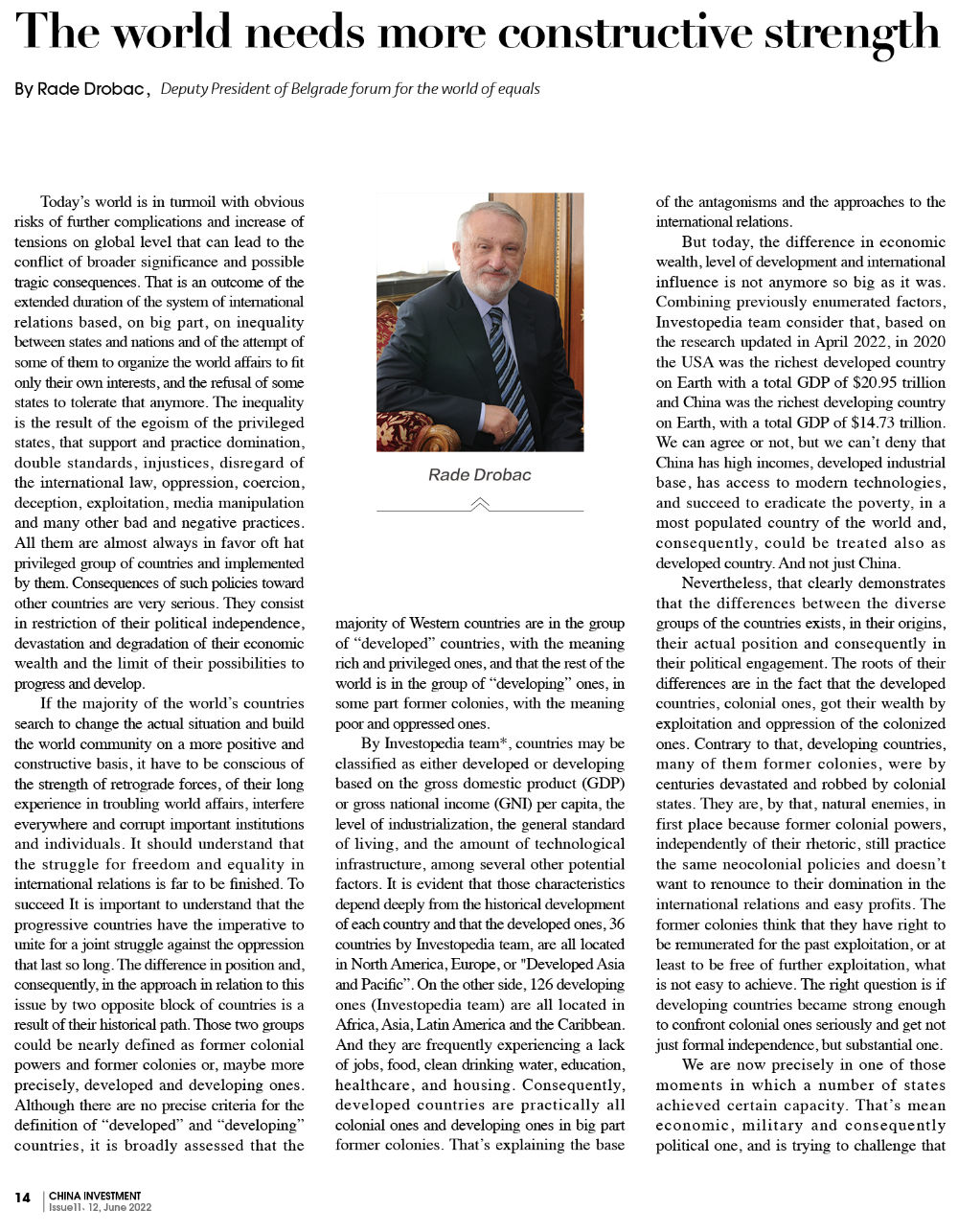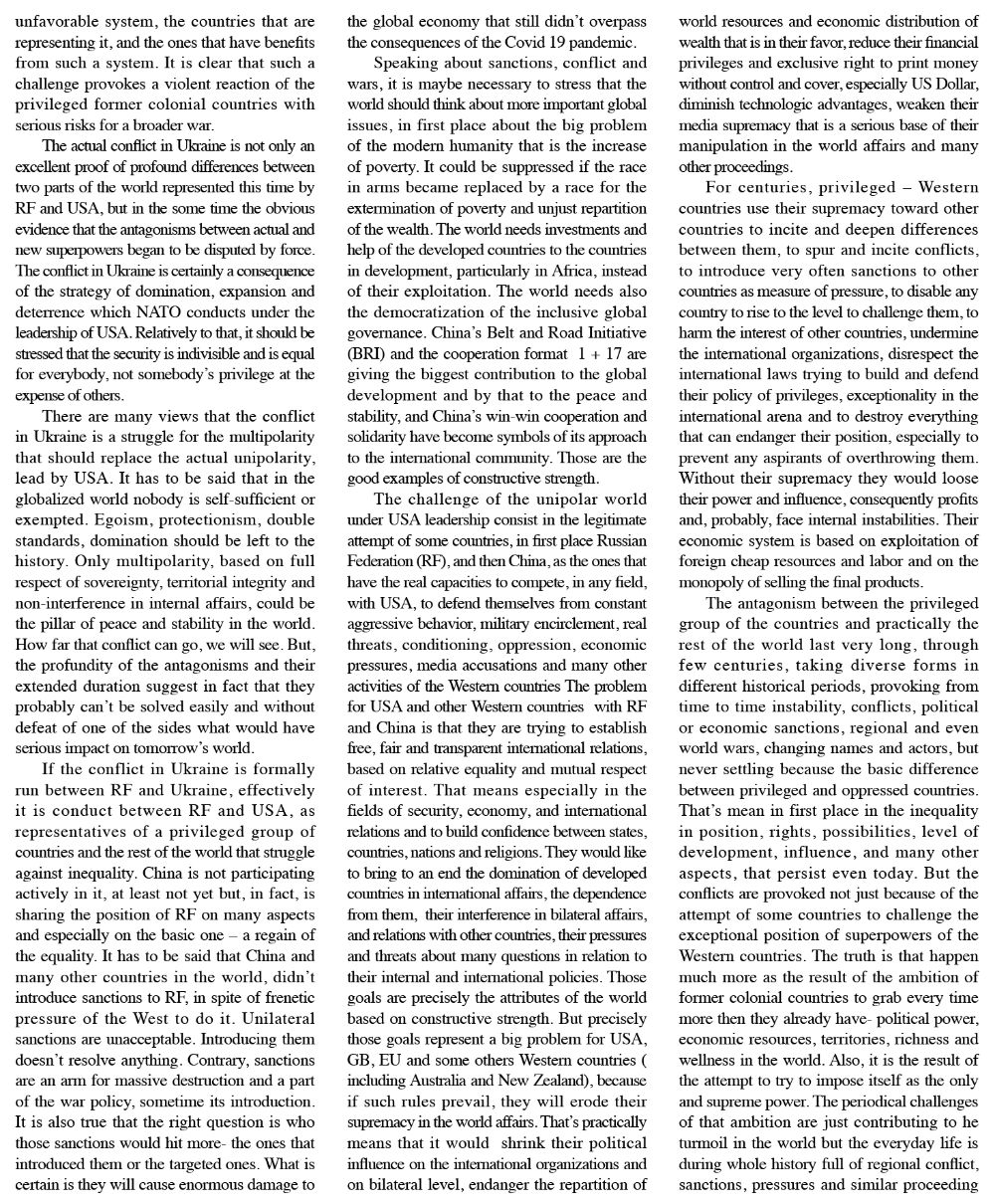The world needs more constructive strength
| Activities - Comments |


Today’s world is in turmoil with obvious risks of further complications and increase of tensions on global level that can lead to the conflict of broader significance and possible tragic consequences. That is an outcome of the extended duration of the system of international relations based, on big part, on inequality between states and nations and of the attempt of some of them to organize the world affairs to fit only their own interests, and the refusal of some states to tolerate that anymore. The inequality is the result of the egoism of the privileged states, that support and practice domination, double standards, injustices, disregard of the international law, oppression, coercion, deception, exploitation, media manipulation and many other bad and negative practices. All them are almost always in favor oft hat privileged group of countries and implemented by them. Consequences of such policies toward other countries are very serious. They consist in restriction of their political independence, devastation and degradation of their economic wealth and the limit of their possibilities to progress and develop.
If the majority of the world’s countries search to change the actual situation and build the world community on a more positive and constructive basis, it have to be conscious of the strength of retrograde forces, of their long experience in troubling world affairs, interfere everywhere and corrupt important institutions and individuals. It should understand that the struggle for freedom and equality in international relations is far to be finished. To succeed It is important to understand that the progressive countries have the imperative to unite for a joint struggle against the oppression that last so long. The difference in position and, consequently, in the approach in relation to this issue by two opposite block of countries is a result of their historical path. Those two groups could be nearly defined as former colonial powers and former colonies or, maybe more precisely, developed and developing ones. Although there are no precise criteria for the definition of “developed” and “developing” countries, it is broadly assessed that the majority of Western countries are in the group of “developed” countries, with the meaning rich and privileged ones, and that the rest of the world is in the group of “developing” ones, in some part former colonies, with the meaning poor and oppressed ones.
By Investopedia team*, countries may be classified as either developed or developing based on the gross domestic product (GDP) or gross national income (GNI) per capita, the level of industrialization, the general standard of living, and the amount of technological infrastructure, among several other potential factors. It is evident that those characteristics depend deeply from the historical development of each country and that the developed ones, 36 countries by Investopedia team, are all located in North America, Europe, or “Developed Asia and Pacific”. On the other side, 126 developing ones (Investopedia team) are all located in Africa, Asia, Latin America and the Caribbean. And they are frequently experiencing a lack of jobs, food, clean drinking water, education, healthcare, and housing. Consequently, developed countries are practically all colonial ones and developing ones in big part former colonies. That’s explaining the base of the antagonisms and the approaches to the international relations.
But today, the difference in economic wealth, level of development and international influence is not anymore so big as it was. Combining previously enumerated factors, Investopedia team consider that, based on the research updated in April 2022, in 2020 the USA was the richest developed country on Earth with a total GDP of $20.95 trillion and China was the richest developing country on Earth, with a total GDP of $14.73 trillion. We can agree or not, but we can’t deny that China has high incomes, developed industrial base, has access to modern technologies, and succeed to eradicate the poverty, in a most populated country of the world and, consequently, could be treated also as developed country. And not just China.
Nevertheless, that clearly demonstrates that the differences between the diverse groups of the countries exists, in their origins, their actual position and consequently in their political engagement. The roots of their differences are in the fact that the developed countries, colonial ones, got their wealth by exploitation and oppression of the colonized ones. Contrary to that, developing countries, many of them former colonies, were by centuries devastated and robbed by colonial states. They are, by that, natural enemies, in first place because former colonial powers, independently of their rhetoric, still practice the same neocolonial policies and doesn’t want to renounce to their domination in the international relations and easy profits. The former colonies think that they have right to be remunerated for the past exploitation, or at least to be free of further exploitation, what is not easy to achieve. The right question is if developing countries became strong enough to confront colonial ones seriously and get not just formal independence, but substantial one.
We are now precisely in one of those moments in which a number of states achieved certain capacity. That’s mean economic, military and consequently political one, and is trying to challenge that unfavorable system, the countries that are representing it, and the ones that have benefits from such a system. It is clear that such a challenge provokes a violent reaction of the privileged former colonial countries with serious risks for a broader war.
The actual conflict in Ukraine is not only an excellent proof of profound differences between two parts of the world represented this time by RF and USA, but in the some time the obvious evidence that the antagonisms between actual and new superpowers began to be disputed by force. The conflict in Ukraine is certainly a consequence of the strategy of domination, expansion and deterrence which NATO conducts under the leadership of USA. Relatively to that, it should be stressed that the security is indivisible and is equal for everybody, not somebody’s privilege at the expense of others.
There are many views that the conflict in Ukraine is a struggle for the multipolarity that should replace the actual unipolarity, lead by USA. It has to be said that in the globalized world nobody is self-sufficient or exempted. Egoism, protectionism, double standards, domination should be left to the history. Only multipolarity, based on full respect of sovereignty, territorial integrity and non-interference in internal affairs, could be the pillar of peace and stability in the world. How far that conflict can go, we will see. But, the profundity of the antagonisms and their extended duration suggest in fact that they probably can’t be solved easily and without defeat of one of the sides what would have serious impact on tomorrow’s world.
If the conflict in Ukraine is formally run between RF and Ukraine, effectively it is conduct between RF and USA, as representatives of a privileged group of countries and the rest of the world that struggle against inequality. China is not participating actively in it, at least not yet but, in fact, is sharing the position of RF on many aspects and especially on the basic one – a regain of the equality. It has to be said that China and many other countries in the world, didn’t introduce sanctions to RF, in spite of frenetic pressure of the West to do it. Unilateral sanctions are unacceptable. Introducing them doesn’t resolve anything. Contrary, sanctions are an arm for massive destruction and a part of the war policy, sometime its introduction. It is also true that the right question is who those sanctions would hit more- the ones that introduced them or the targeted ones. What is certain is they will cause enormous damage to the global economy that still didn’t overpass the consequences of the Covid 19 pandemic.
Speaking about sanctions, conflict and wars, it is maybe necessary to stress that the world should think about more important global issues, in first place about the big problem of the modern humanity that is the increase of poverty. It could be suppressed if the race in arms became replaced by a race for the extermination of poverty and unjust repartition of the wealth. The world needs investments and help of the developed countries to the countries in development, particularly in Africa, instead of their exploitation. The world needs also the democratization of the inclusive global governance. China’s Belt and Road Initiative (BRI) and the cooperation format 1 + 17 are giving the biggest contribution to the global development and by that to the peace and stability, and China’s win-win cooperation and solidarity have become symbols of its approach to the international community. Those are the good examples of constructive strength.
The challenge of the unipolar world under USA leadership consist in the legitimate attempt of some countries, in first place Russian Federation (RF), and then China, as the ones that have the real capacities to compete, in any field, with USA, to defend themselves from constant aggressive behavior, military encirclement, real threats, conditioning, oppression, economic pressures, media accusations and many other activities of the Western countries The problem for USA and other Western countries with RF and China is that they are trying to establish free, fair and transparent international relations, based on relative equality and mutual respect of interest. That means especially in the fields of security, economy, and international relations and to build confidence between states, countries, nations and religions. They would like to bring to an end the domination of developed countries in international affairs, the dependence from them, their interference in bilateral affairs, and relations with other countries, their pressures and threats about many questions in relation to their internal and international policies. Those goals are precisely the attributes of the world based on constructive strength. But precisely those goals represent a big problem for USA, GB, EU and some others Western countries ( including Australia and New Zealand), because if such rules prevail, they will erode their supremacy in the world affairs. That’s practically means that it would shrink their political influence on the international organizations and on bilateral level, endanger the repartition of world resources and economic distribution of wealth that is in their favor, reduce their financial privileges and exclusive right to print money without control and cover, especially US Dollar, diminish technologic advantages, weaken their media supremacy that is a serious base of their manipulation in the world affairs and many other proceedings.
For centuries, privileged – Western countries use their supremacy toward other countries to incite and deepen differences between them, to spur and incite conflicts, to introduce very often sanctions to other countries as measure of pressure, to disable any country to rise to the level to challenge them, to harm the interest of other countries, undermine the international organizations, disrespect the international laws trying to build and defend their policy of privileges, exceptionality in the international arena and to destroy everything that can endanger their position, especially to prevent any aspirants of overthrowing them. Without their supremacy they would loose their power and influence, consequently profits and, probably, face internal instabilities. Their economic system is based on exploitation of foreign cheap resources and labor and on the monopoly of selling the final products.
The antagonism between the privileged group of the countries and practically the rest of the world last very long, through few centuries, taking diverse forms in different historical periods, provoking from time to time instability, conflicts, political or economic sanctions, regional and even world wars, changing names and actors, but never settling because the basic difference between privileged and oppressed countries. That’s mean in first place in the inequality in position, rights, possibilities, level of development, influence, and many other aspects, that persist even today. But the conflicts are provoked not just because of the attempt of some countries to challenge the exceptional position of superpowers of the Western countries. The truth is that happen much more as the result of the ambition of former colonial countries to grab every time more then they already have- political power, economic resources, territories, richness and wellness in the world. Also, it is the result of the attempt to try to impose itself as the only and supreme power. The periodical challenges of that ambition are just contributing to he turmoil in the world but the everyday life is during whole history full of regional conflict, sanctions, pressures and similar proceeding through which western superpowers were trying to keep the rest of the world under their domination, supremacy and rules, exploit their wealth and resources and prevent them to develop and possibly challenge them.
The colonial policy was based on inequality, injustice, slavery, exploitation, including all kind of inhuman proceeding against indigenous populations in Africa, America and Asia. From that time, colonial countries adopted the stand of underestimation of indigenous population, then on much lower civilization level. From the difference in level of development and civilization they concluded that the indigenous population deserve to be treated differently that their own, that means much worse. Such an approach had as consequence the behavior toward the indigenous population without any respect of their rights on life, property, territory, integrity, practicing inequality, injustices, slavery, forced labor, exploitation, pressures, conditioning and in some cases even almost total extermination. The problem is because it seems that former colonial powers still believe in the supremacy of their race, culture and civilization and are continue treating the rest of the world and especially their former colonies as inferior. If we analyze the nowadays behavior and the activities of those former colonial powers we can’t avoid to conclude that they are acting on the same old colonial way as in the past. The source of a wealth of today’s richest countries in the world is precisely that period of a wild exploitation of the colonies, using against the indigenous population every mean to keep it enslaved and obedient, in order to continue the robbery as long as possible. The exploitation of the colonies continued during centuries, changing name to neocolonial. In fact, until nowadays, there ware no big changes. In recent time, such policy is called globalization but, in essence, that was always the same policy and the same approach.
The basic difference between the former colonial block of countries and the block, if we can speak in those terms, of “constructive” countries, could be more understandable with some example; perhaps Serbia could be a good one. Speaking about the violent break up of Yugoslavia, inspired from outside, in the nineteen’s of the previous century, Serbia was the only one accused and guilty for that without taking in account that it was the only one to defend Yugoslavia, as the only legal country in the moment of the attack on it. Serbia was also accused for the crimes and destructions during the civil war committed everywhere on the former Yugoslav territory, regardless the fact that Serbs were all the time first to be attacked. Serbs were accused to be occupiers of territories they lived for centuries, accused for ethnic cleansing of other nationalities and religions contrary of the evidence that they were the only ones ethnically cleansed from Croatia, Bosnia and Hertzegovine (BiH) and Kosovo and Metohija (KiM). Serbia was the sole republic to be subject of severe sanctions of Western countries, attacked by NATO in 1999. (19 mightiest and richest countries of that time) during 78 days, part of its state territory was usurped and put under UN control under false accusations. After that, without any opposition or protest, it was silently given to be occupied by Albanian terrorist and recognized by colonial countries as independent state in 2008 (although illegally), complete political and military leadership of Serbia and Republika Srpska were broth to the illegal Hague tribunal and sentenced. In the same time, the leaders and dignitaries of other republics were liberated. All that is a very good example of the behavior of the former colonial countries, their devotion to a international laws, justice, and truth.
Another good example could be the candidature of Serbia for the full membership in the EU. Serbia applied for a full membership in December 2009 and, until now, didn’t advanced very much. There is always new preconditions to achieve, temporary goals to reach, requests to fulfill, new exigencies and expectations to be delivered and even when done, there is little progress but new conditions comes. Out of very complex and complicated procedures to fulfill, practically “unique” there is always some new “crucial” conditions to reach as the most important step for the faster membership. It was first to deliver to the Hague tribunal former President of Serbia Slobodan Milosevic. Once done, it was to deliver general Ratko Mladic, then Radovan Karadzic, former President of BiH, then successively many times new requests. Today, in 2022, Serbia is still far away of the membership in EU and there is of course new conditions – to recognize KiM, to stop to support Republika Srpska, to renounce from the cooperation with RF and China, because of their “negative influence on Serbia”. And there are many additional requests.
In the same time, Serbia is cooperating very much with RF and China, on base of equality, under fair and correct agreements and acceptable financial arrangements, friendly, without any precondition of similar proceeds, respecting contracts, dates, quality and with full mutual respect. The cooperation between Serbia and China and RF is constantly progressing, on political, but also economic and all other levels, including military-technical cooperation, cooperation in big infrastructural projects, in energy, in the field of transport and all that without any political conditioning. Even contrary to that, with open support in the UN in the questions that are on the vital interest of Serbia, not just because Serbia and China and RF are friends, but because they support the international law and the legality in international affairs. In short, they cooperate on constructive basis and that could be the model how the countries from over the world should cooperate and cherish their relations and interests.
The actual circumstances in the world offer real possibilities for states such RF and China to change the state of things and abolish, at least to some extent, the negative interference and influence of former colonial countries to other states, international organizations and institutions, and by that dismantle the colonial net existing from centuries. They have the opportunity to bring to an end the inequality, injustice and exploitation, liberate the world from chains and open new era of free and open world. By defending itself and their equality, they will defend the oppressed countries, revitalize international organizations and institutions, inciting the rest of the international community to lean on international law, give possibility for free and fair economic cooperation for everybody and continue to give by their example the confirmation that it is possible. On that way they would help the world to rely on constructive forces, interested for free, fair and just international relations and for the equal opportunities for every state to follow its lucky star and achieve its goals- political, economic and social and every other. In that aim it should be crucial to search to achieve those goals respecting fully the interests of its partners, not to act against them, but also, to prevent former colonial states to continue to manipulate and dominate in international affairs. That is certainly not an easy task, even it is risky, but is worth to fight for.
| < Prev | Next > |
|---|
| Overstatement from Davos 2017. |
Liberal corporative capitalism, for reasons of lowering traveling costs, proposed not to travel to history alone but packed togather with NATO, EU and unipollar World Order. Workers participation has good chances to step in provisionally, buying time for full scale workers selfmanagment. |









